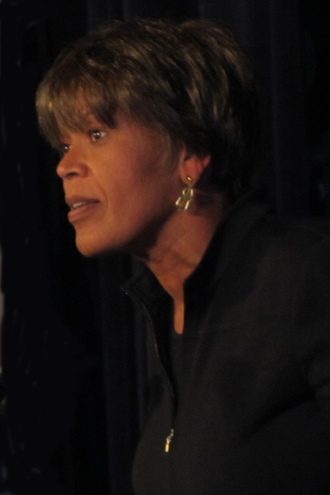Walker MLK Day challenge: Take risks, out of love
The world is a mess, the TV newswomen-turned-minister said, urging youth to act

Liz Walker
 Photos/Charles A. Radin
Photos/Charles A. RadinVolunteers included Brandeis students, representatives of community organizations and these high school and middle school students from neighboring towns.

Volunteers brought bags of donated winter clothing to some of the sites they visited.
Former television news anchor Liz Walker, winner of numerous media honors, held the crowd at Brandeis’ annual memorial to the Rev. Dr. Martin Luther King Jr. spellbound with the story of how she gave up a glamorous and lucrative life to become a humanitarian activist and minister.
Speaking to students, faculty and community activists who jammed Levin Ballroom to capacity, Walker recounted the atrocities she witnessed on her first trip to Sudan , in 2001, and recalled feeling that there was “nothing two little women from Boston, Mass., could do” but come home and tell a few people about it.
Her friend, the Rev. Gloria White-Hammond, with whom she was traveling, said "no, no, no. There is something we can do. We can at least try.”
Walker described the result: A place with no electricity, no lights, no computers, where goats and cows wander in and out -- a school for 500 girls, built and sponsored by the two women and others they recruited, and which transformed Walker's life.
“Leaving televisions news and going into humanitarian work, what you learn is there is more in life than money,” Walker said. “What you do for love is the most important thing you do in life.” She defined love, too: “Love is what you do for the other who does not look like you.”
Walker recalled with humor and passion a visit that Dr. King made to her hometown, Little Rock, Arkansas, when she was a small girl. “Everyone was saying the King is coming, the King is coming,” Walker said. “I thought they were talking about Jesus.”
She sat up in the church balcony and was deeply impressed with King’s sermon on love – then forgot his message as she sought fame and fortune. The suffering in Sudan, and the determination of her friend, brought it back.
“It is time to take a risk for love,” she told the crowd, challenging them to really look at what is happening around them. “Everything is changing,” Walker said. “The world is a mess;” many countries are without sufficient water or food. In America, the leadership is stalemated and “nobody wants to talk to anybody.”
But, she said, young people are on the move, demanding better, as they did in the civil rights movement.
“The Occupy Movement, the Arab Spring are all part of this moment,” she said, urging people to “seize this moment for love, love. There is risk in this. You may fail… but you will be part of the arc of the universe, Dr. King’s arc.”
The reference was to a famous and inspirational statement by King that “the arc of the moral universe is long, but it bends toward justice.”
Walker’s talk was bracketed by musical performances and poetry, and the evening was preceded by an afternoon of community service organized by Protestant Chaplain Alexander Levering Kern and Cooperative Metropolitan Ministries.
The organizers estimated that more than 400 volunteers turned out from Brandeis, Waltham and neighboring communities for volunteer work that included, among other things, preparing care packages for children in need, visiting the homeless and other disadvantaged people, and greening a church and a synagogue.
The biggest single contingent of service workers apparently was the midyear-entering cohort of Brandeis students, who volunteered at Greater Waltham ARC, a community organization dedicated to improving the lives of people with developmental disabilities.
Some of the volunteers had pizza and salad and reflected on their day’s experiences in International Lounge prior to the King memorial program.
President Fred Lawrence addressed the volunteers briefly, telling the group, which included many clergy, that “I think what God wants of us is to work together.
“It’s very nice to be together and say words of prayer,” Lawrence said, “but I was always taught that the hardest part of the Day of Atonement, for example, is not the time when you’re praying…. The hard part is right after that. You walk out of the place of worship and you have to do it. The action is where the rubber meets the road.”
“Hundreds of us doing acts of community service today – that’s something we can tell Dr. King,” he said. “Not that we got it perfect, but that we’re getting better.”
“The world is a somewhat better place today for the work that was done today,” Lawrence said, “and we’ll get up tomorrow and do it again.”
Categories: General





